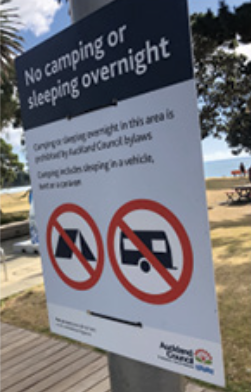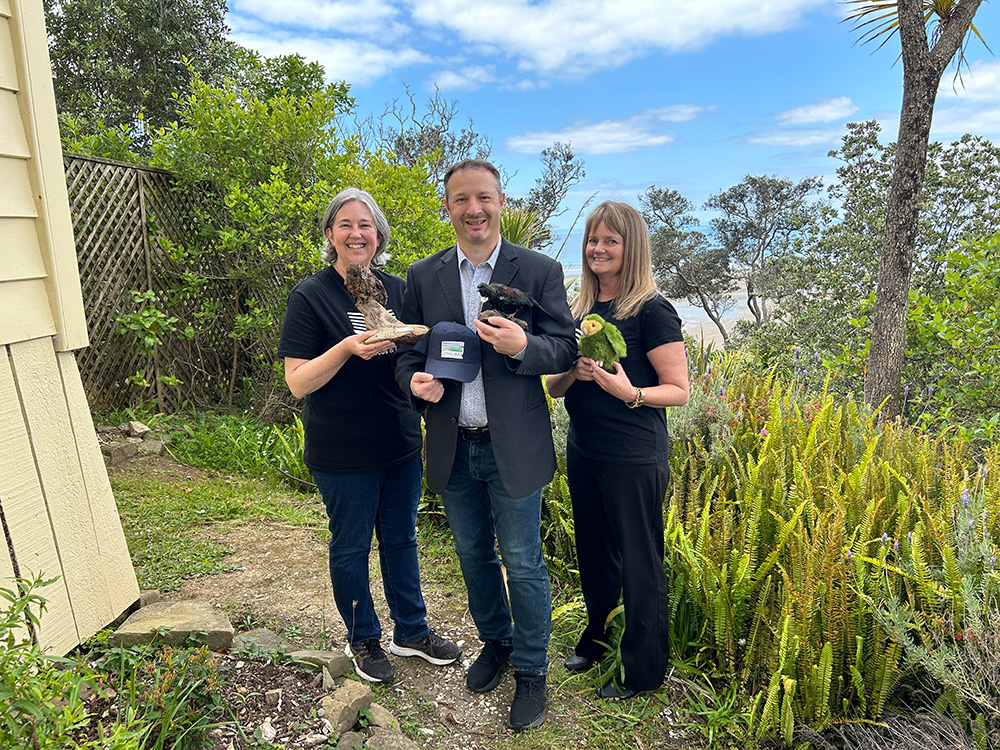The East Coast Bays is one of Auckland’s jewels. Stunning beaches, with popular ice cream parlours, cafés and bars all within an easy stroll of ample car parking. As locals, we all enjoy sharing our corner of the world with the many summer day-trippers who visit the area, patronise our local services, and pack up tidily at the end of the day.
Town manager Kim Murdoch observes, “The bustling beach between Christmas and New Year served to remind our business community of how fortunate we are to be trading in such a beautiful part of the country. The town centre relies on visitors to spend money in shops and eateries over summer, and visitors to the beach typically venture across the road with their wallets.”
Unfortunately, some Bays’ visitors attracted attention for all the wrong reasons over Christmas and New Year, with several reports in the press and much chatter on social media about anti-social behaviour by holidaying overnight campers.
Historically, there have always been a few people who choose to ignore the rules, but the problems seem to have been far more prevalent this time. In fact, Hibiscus and Bays local board member Julia Parfitt first received a resident’s text message noise complaint at 6.15 am on Christmas Day. Over the next 10 days, these notifications, along with calls to Auckland Transport (AT) and Auckland Council, snowballed.
“I’ve been a local government representative for a few decades now,” remarks Julia, “and I’d never seen anything like this.”
Nor does it appear that these holidaymakers contributed much to the local economy. “We found that, on the whole, takings didn’t increase over the Christmas/New Year period despite the beach being extremely busy. Presumably, this was due to many of the visitors bringing food and other provisions with them. Conversely, businesses did not appear to suffer a downturn in takings, although this is hard to measure as we’re not in a normal spending cycle due to a raft of factors relating to Covid-19,” comments Kim.
The issue of overnight campers in Browns Bay has long been contentious. The beachfront is gazetted as a reserve, and overnight camping is therefore strictly prohibited under the Reserves Act, as is lighting open fires. It is, however, entirely permissible to pitch a tent between dawn and dusk. (Dusk being legally defined as 30 minutes past sunset.) After this, trespass notices can be issued.
Seemingly, most residents’ complaints centred on one large and highly organised group of overnight campers. These people knew exactly where to find and how to break into the power supply and brought generators with them. Vehicles were driven across the new boardwalk, removing bollards to enable parking on the grass and beach. Tents were pitched on the children’s play area, and there were even reports of swimming togs and towels being hung out to dry on the war memorial. Under the circumstances, it seems that increased signage would have had little or no effect – although that has now been erected.
There were numerous reports of overflowing rubbish bins, food left on the beach, noise pollution, illegal car parking, and general anti-social behaviour. Local MP Erica Stanford was quickly on the case, liaising with NZ Police’s acting area commander and being instrumental in getting several vehicles removed from site.

Admittedly, press headlines at the time may have been sensationalised or at least required context. The report of knives being thrown at seagulls was apparently one person shooing away birds from her barbecue – so, still not acceptable, but not the repeated acts of violence implied. An alarming social media post of a park ranger being threatened with a knife was investigated by the regional parks’ manager, who found that no incident had been recorded internally. Hopefully, then, this claim was inaccurate.
There were other stories too, such as when one local was approached during his early morning beach walk and asked: “Who runs the town?” He directed the two gentlemen to the chairman of the local business association, who was told the group wanted to be provided with hot water for showers. That request was politely denied.
As well as the complaints themselves, residents expressed their irritation on social media at a perceived lack of response from authorities. As local board member Alexis Poppelbaum explains, “By their own admission, the compliance team run on a skeleton staff at the best of times and had just a couple of staff members rostered on over the peak holiday period for enforcement across the entire region. I know that many residents were incredibly frustrated that the response from Auckland Council’s customer service was: ‘There are other issues of higher priority, and we can’t get to this matter.'” This was further compounded by some call centre staff being unfamiliar with the North Shore region and unsure of the rules as to where different authorities’ enforcement responsibilities lay.
The process of dealing with noise, nuisance behaviour, inappropriate parking, and other anti-social matters is, as Julia Parfitt describes, “convoluted”. The three authorities involved are AT, Auckland Council, and NZ Police, each with different powers of enforcement working under various pieces of legislation. Alexis acknowledges residents’ frustrations. “I sympathise with the sentiment of ‘why bother having bylaws if they aren’t enforced’. I know that other local boards have had similar issues over the summer period.”
Alexis adds that, in previous years, an MBIE grant provided the council with funds for preventative walkarounds by interns, who took an educational approach and explained the rules to overnight campers. This strategy had largely positive outcomes but couldn’t happen this time because the funding was no longer available. With legislation being passed to allow fines of up to $800 for illegal overnight camping, Julia says it would make sense for these monies to fund this kind of enforcement.
In the medium-term, she and Alexis confirm that Hibiscus and Bays is working with other local boards to ensure more resources are available for Waitangi weekend, including the possible use of external security contractors. North Harbour Community Patrol will help too, taking photos of any offending vehicles or campervans during their evening patrols.
Longer-term, they both agree that “a whole body of work” needs to be done to ensure streamlined reporting and enforcement processes. “Improved communication and understanding both internally and between the different parties should ensure that this issue (and a range of other bylaw breaches that occur relating to dogs, public safety and nuisance, and so on) are resolved,” Alexis confirms. “My view is that the enforcement of bylaws is core council business that has to be efficient and effective.”
Kim Murdoch agrees, “The business community is behind locals’ concerns around the beach area being disrespected by visitors, particularly overnight campers, vehicles parked on the beach, and littering. It is, of course, of concern to businesses that locals choose not to come to the beach at these times. We want everyone to be able to make the most of our stunning town over summer, and we trust that steps are being taken to alleviate these problems.”
To register complaints about noise, rubbish or damaged facilities, call Auckland Council on 09 301 0101 or use their online complaints form (which includes a map so you can pinpoint a location). Make sure you get a case number so that it’s easier to follow up on your report. Plus, resources are allocated proportionally to the number of complaints recorded.
To report illegally parked vehicles, call Auckland Transport on 09 355 3553. Photographic evidence is useful.
If you witness or experience any aggressive or abusive behaviour, call 111 immediately.
Remember that you are welcome to attend Hibiscus and Bays Local Board public forums to be part of the discussion and see how your local representatives are acting on your concerns. To contact the board, e-mail hibiscusandbayslocalboard@aucklandcouncil.govt.nz or call (09) 301 0101
Finally, please avoid the temptation to let off steam on social media. Photographs of illegally parked vehicles may be useful, but inflammatory comments aren’t helpful (and could see you banned from online community groups).






